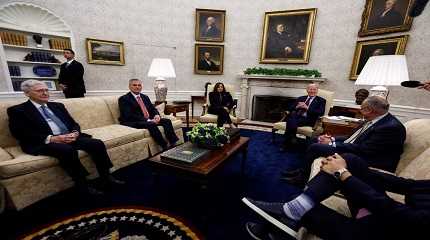
WASHINGTON, May 17 (Reuters) - President Joe Biden and top U.S. congressional Republican Kevin McCarthy on Wednesday underscored their determination to reach a deal soon to raise the federal government's $31.4 trillion debt ceiling and avoid an economically catastrophic default.
After a monthslong standoff, the Democratic president and the speaker of the House of Representatives on Tuesday agreed to negotiate directly on a deal. An agreement needs to be reached and passed by both chambers of Congress before the federal government runs out of money to pay its bills, as soon as June 1.
"We're going to come together because there's no alternative," Biden told reporters at the White House, saying he would cut short his trip to Asia and return to Washington on Sunday, but staff-level discussions would continue in Washington.
"To be clear, this negotiation is about the outlines of the budget, not about the whether or not we're going to (pay our debts)," Biden said. "The leaders (of Congress) have all agreed: We will not default. Every leader has said that."
Republicans, who control the House by a 222-213 majority, for months had been insisting that Democrats agree to spending cuts in exchange for a deal to raise Congress's self-imposed debt limit. The limit needs to be lifted regularly because the government spends more than it takes in taxes.
Asked by reporters at the Capitol whether it's possible to reach a debt ceiling deal by the time Biden returns from Asia on Sunday, McCarthy replied, "It's doable."
"We're on such a short timeline," McCarthy said. "It makes it almost harder. But there's one thing you know, for me, I never give up. I have the grit, the perseverance and we're gonna get it done."
The two-way conversation streamlines the prior five-way format of the past week that included the three other top congressional leaders.
Biden left on Wednesday for the Group of Seven summit of world leaders Friday through Sunday in Hiroshima, Japan.
On Tuesday, Biden and McCarthy met for about an hour at the White House with Senate Majority Leader Chuck Schumer, Senate Republican leader Mitch McConnell and House Democratic leader Hakeem Jeffries.
Biden plans a news conference in Hiroshima on Sunday before leaving to return to Washington, a White House official said.
Financial markets appeared to be buoyed by those discussions, with U.S. stocks higher on Wednesday, partly due to cautious optimism among investors as talks continued.
The U.S. Treasury has said it could start running out of funds as early as June 1 to pay the government's bills -- a develop economists say would trigger a recession.
Negotiators are aiming to hammer out an agreement before Biden's scheduled return to Washington on Sunday. Congress would then have to act swiftly before the June 1 deadline hits.
McCarthy said the House would vote first on any deal before sending it on the Senate, which Biden's Democrats control by a 51-49 margin, for approval. Senate rules would require at least nine Republicans to go along with any deal.
WORK REQUIREMENTS
Negotiations are continuing over the longevity of any deal, work requirements for aid programs for the poor, including food subsidies, and spending caps.
The work requirement discussions focus on the Supplemental Nutrition Assistance Program (SNAP), previously known as food stamps, and the Temporary Assistance for Needy Families program, according to sources briefed on the negotiations, who spoke on condition of anonymity to reveal details about closed-door negotiations. Biden has previously said that he would not be open to discussions of work requirements for the Medicaid health insurance program for low-income Americans.
He told reporters on Wednesday that he would not accept any work requirement changes that would affect recipients' health needs.
"It's possible there could be a few ... but not anything of consequence," he said.
McCarthy in a CNBC interview defended conservatives' call for work requirements, saying they would help the economy and boost the workforce, and vowed to exclude any discussion of taxes.
Raising taxes on the wealthy and companies to help pay for programs for other Americans is a key part of Biden's 2024 budget, and the president on Tuesday said he was disappointed that Republicans will not consider ways to raise revenue.
In a statement, Jeffries said he was hopeful a bipartisan deal would be reached but that House Democrats would file a "discharge petition" in case it was needed to bypass regular chamber procedures to act on the debt limit and avoid a default.




